Related Research Articles

Phnom Penh is the capital and most populous city of Cambodia. It has been the national capital since the French protectorate of Cambodia and has grown to become the nation's primate city and its economic, industrial, and cultural centre. Before Phnom Penh became capital city, Oudong was the capital of the country.
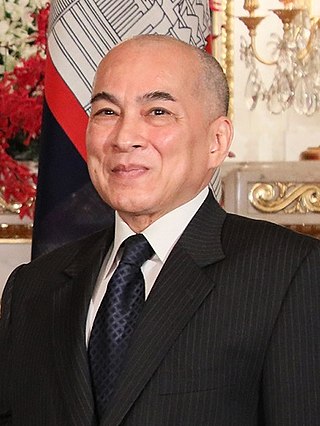
Norodom Sihamoni is King of Cambodia. He became King on 14 October 2004, a week after the abdication of his father, Norodom Sihanouk.
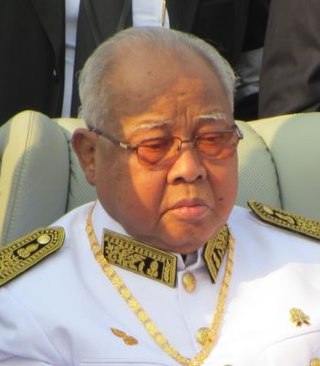
Chea Sim was a Cambodian politician. He was President of the Cambodian People's Party from 1991 to 2015, President of the National Assembly of Cambodia from 1981 to 1998 and President of the Senate from 1999 to 2015. His official title was Samdech Akka Moha Thomma Pothisal Chea Sim.
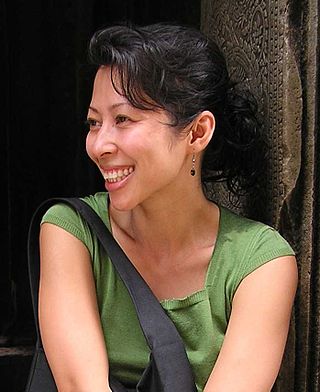
Loung Ung is a Cambodian-American human-rights activist, lecturer and national spokesperson for the Campaign for a Landmine-Free World from 1997 to 2003. She has served in the same capacity for the International Campaign to Ban Landmines, which is affiliated with the Vietnam Veterans of America Foundation.
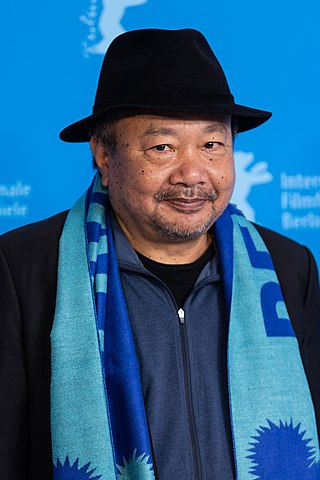
Rithy Panh is a Cambodian documentary film director and screenwriter.
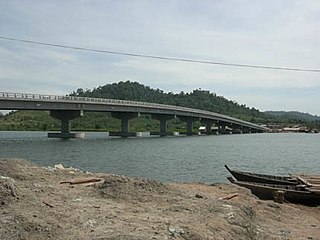
Khemarak Phoumin, also Koh Kong, is the capital and largest city of Koh Kong Province in Cambodia. It is near the mouth of the Kah Bpow river in Smach Mean Chey District on the Gulf of Thailand. The city lies only 10 kilometres (6.2 mi) from the Thai border. It is 138 kilometres (86 mi) by Highway 48 to National Highway 4 at Sre Ambel and a further 133 kilometres (83 mi) to Phnom Penh. After completion of the bridges on Highway 48 in 2010 the land link to Phnom Penh and Sihanoukville has significantly improved.
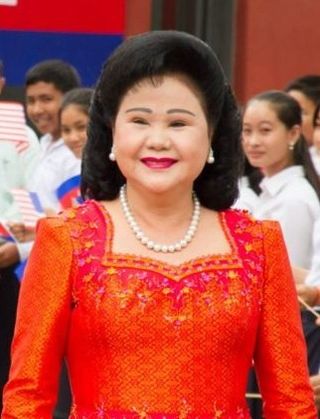
Bun Rany is the spouse of the former Prime Minister of Cambodia Hun Sen. She also served as the vice president of the National Association of the Cambodian Red Cross and, since 1998, as its president. She has received national and international recognition and numerous awards for her work and endeavor with Cambodia's orphans and poor, HIV/AIDS awareness and prevention, and her emphasis on women's issues with efforts to improve domestic safety and empowerment through education and vocational training. Her full honorary title is Samdech Kittipritbandit Bun Rany Hun Sen.

Samdech Preah Agga Maha Sangharajadhipati Tep Vong was a Cambodian Buddhist monk who served as the Great Supreme Patriarch of Cambodia until his death in 2024. He was well known for his role in re-establishing the Cambodian monkhood after the Pol Pot period and for his links to dominant political leaders after the 1980s.
George Chigas is an American writer, scholar and expert on Cambodian culture and the crimes of the Khmer Rouge. He is currently an associate teaching professor in the World Languages and Cultures department at the University of Massachusetts Lowell.
The Don Bosco Foundation of Cambodia is a Non-profit organization of education founded in Cambodia in 1991 to give technical skill education to youth living in extreme poverty and to facilitate the schooling of marginalized children. The organization was a way to answer the needs of a country in its post-war period of reconstruction. DBFC is a branch of the Salesians of Don Bosco. The United Nations asked to the Salesians in Thailand to attend the children and youth of the Cambodian Refugee camps during the 1980s. DBFC answered this request by opening provisional technical schools in the camps. After the peace agreements, the organization was invited by the Cambodian government to settle in the country. The first printing press in Cambodia after the war, was provided by DBFC in the Don Bosco Technical School of Phnom Penh for the republishing, translating and writing of books and documents of education. Many schools were rebuilt in the villages and the Organization gained prestige as the first institution to provide technical education and to offer sponsorship to Cambodian children.
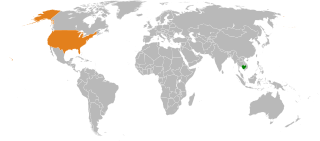
Bilateral relations between the United States and Cambodia, while strained throughout the Cold War, have strengthened considerably in modern times. The U.S. supports efforts in Cambodia to combat terrorism, build democratic institutions, promote human rights, foster economic development, eliminate corruption.

Mu Sochua is a Cambodian politician and rights activist. She was a Member of Parliament (MP) for Battambang from 2013 to 2017, a seat which she previously held from 1998 to 2003. She was a member and Vice President of the Cambodia National Rescue Party (CNRP) until its dissolve, and previously a member of the Sam Rainsy Party (SRP) prior to its merger with the Human Rights Party. As a member of FUNCINPEC, she also served as Minister of Women and Veterans' Affairs in Hun Sen's coalition government from 1998 to 2004. She is currently one of 118 senior opposition figures serving a five-year ban from politics following a court ruling on 16 November 2017.
Christopher Minko is an Australian musician and co-founder of the Phnom Penh-based Delta blues group called Krom. Living in Cambodia since 1996, Minko is also the founder and Secretary General of the Cambodian National Volleyball League (Disabled) NGO, also known as CNVLD.

Cambodian genocide denial is the belief expressed by some Western academics that early claims of atrocities committed by the Khmer Rouge government (1975–1979) in Cambodia were much exaggerated. Many scholars of Cambodia and intellectuals opposed to the US involvement in the Vietnam War denied or minimized reports of human rights abuses of the Khmer Rouge, characterizing contrary reports as "tales told by refugees" and US propaganda. They viewed the assumption of power by the Communist Party of Kampuchea as a positive development for the people of Cambodia who had been severely impacted by the Vietnam War and the Cambodian Civil War. On the other side of the argument, anti-communists in the United States and elsewhere saw in the rule of the Khmer Rouge vindication of their belief that the victory of Communist governments in Southeast Asia would lead to a "bloodbath."

Youk Chhang is the executive director of the Documentation Center of Cambodia (DC-Cam) and a survivor of the Khmer Rouge's killing fields. He became DC-Cam's leader in 1995, when the center was founded as a field office of Yale University’s Cambodian Genocide Program to conduct research, training and documentation relating to the Khmer Rouge regime. Chhang continued to run the center after its inception as an independent Cambodian non-governmental organization in 1997 and is currently building on DC-Cam's work to establish the Sleuk Rith Institute, a permanent hub for genocide studies in Asia, based in Phnom Penh.

François Ponchaud is a French Catholic priest and missionary to Cambodia. He is best known for his documentation of the genocide which occurred under the Khmer Rouge (KR), and for being one of the first people to expose the human rights abuses being carried out at the time.
The Cambodian humanitarian crisis from 1969 to 1993 consisted of a series of related events which resulted in the death, displacement, or resettlement abroad of millions of Cambodians.

Yoeun Mek was a Cambodian musician who joined the Cambodian Master Performers Program in 1999, an organization founded by his friend Arn Chorn-Pond to preserve Cambodian music, arts and rituals and keep traditional instruments from going extinct. The program, in its quest to preserve Khmer music, sought out Cambodia's "nearly extinct instruments and the people who can make and play them." 80-90% of the musicians of the country were "purged" by the Khmer Rouge from 1975 to 1979. Out of the people who could play the traditional instruments to a high level, the Cambodian Master Performers Program estimated that only 100 to 200 musicians had survived the executions, which targeted almost everyone with an education, those who understood a foreign language, and many artists.
U Sam Oeur is a Cambodian poet, a former member of the Parliament of Cambodia, and a former UN delegate. He is the author of a collection of poetry, Sacred Vows (1998), and a memoir, Crossing Three Wildernesses (2005). He is a devout Buddhist.
References
- ↑ SaklapeL | Chath pierSath Archived August 26, 2007, at the Wayback Machine
- ↑ Chath Piersath